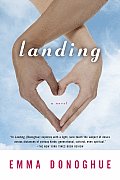
| Publisher: | Harcourt |
| Copyright: | 2007 |
| Printing: | 2008 |
| ISBN: | 0-15-603378-X |
| Format: | Trade paperback |
| Pages: | 324 |
Jude is the archivist for a small museum in the tiny town of Ireland, Ontario, where she's lived her entire life. She's never flown on a plane and doesn't care for the idea, but while her mother is visiting family in England, Jude gets a maddeningly unspecific and frightening call from her aunt saying that she needs to fly over and bring her mother home. That's how she ends up on a trans-Atlantic flight where Síle is working as a flight attendant, has a memorably awful experience with a seatmate, and has coffee in London with Síle to calm down. Which sparks a connection that neither of them can stop thinking about.
A disclaimer is warranted up-front: Landing is lesbian romance, which is not my normal reading genre, and that makes for tricky reviewing. It's very easy to be delighted with the freshness of a new genre (or annoyed at standard tropes that don't make sense from an outside perspective), leading to a much different reaction than a regular reader would have because one has no points of comparison. Almost all the romance I've read has been mixed in with another genre, so the things I find interesting may be routine to those more broadly read.
That said, I found this book a delight. Donoghue sets up a contrast between Jude's small-town focus and Síle's world-traveling (and older) experience from the start, but then develops the contrast along much different lines than a contrast of age and experience. It is a book about how people embed themselves in a place, about the difficulty of coming to terms with a place that isn't your own, and about how strange other people's worlds seem. Pulling that off requires fine balance, and I think that balance is Donoghue's greatest achievement here. Through Síle's eyes, we see the vibrancy of Dublin, the vivaciousness of the huge array of friends she's surrounded herself with, and the strangeness and limitations of small-town Canada. But through Jude's eyes, the quietly strong foundations of a small town shine, and Dublin is chaotic and emotionally dangerous. I was particularly happy to see the way Donoghue handled small-town acceptance: Jude is an out lesbian in an extremely small and somewhat rural town and everyone copes. It's too common to assume the worst of prejudice in small towns, but that isn't how the insider vs. outsider split often happens, and I loved this portrayal.
The other thing I adored about this book was the early development of Jude and Síle's long-distance relationship via letters and email. Not only are the beginnings of this utterly charming, but Donoghue also captures perfectly the feeling of rambling exploration and the weird mix of immediacy and distance that epistolary romance involves. I've never seen epistolary romance captured this well in a book before (with the caveat, as above, that romance is not my regular genre). The letters were a delight, conveying both character and emotion vividly, and I for one was greatly disappointed when Jude and Síle switched to telephone calls.
The early parts of Landing are quietly delightful. The later parts increase the tension considerably, and the last few chapters are nerve-wracking. I think that's worth an advance warning, since not everyone wants that degree of tension in romance reading. But the conflicts are well-grounded in the characters and lives of the protagonists and I think convey well the huge difficulties with remaking one's life to fit with someone else's. Both of the characters were stupid in places, but in ways that I could see myself doing in their place (which makes the cringe factor sharper). It's the good kind of romantic tension: tension that isn't about superficial misunderstandings or stupid communication patterns, but instead is about core issues and values and the difficulty of connecting lives. (That said, I would have liked just a little more denouement.)
The one complaint I will make is a standard complaint about most romance plots: the characters are completely incapable of contemplating the possibility of more than one romantic relationship at a time. Entering a relationship with someone new inherently requires breaking up one's current relationship. I still find this implicit assumption endlessly frustrating. In this particular case, one of the relationships in question clearly wouldn't have been sustainable and the other separation was not hugely traumatic, but I still wish the characters would have at least considered a possible alternative. From the text, it doesn't seem like the thought even entered their minds. This always feels like false drama to me: making all romance bittersweet by requiring that it terminate other relationships that may not be perfect but that were still offering something to the people involved.
But, that aside, I thoroughly enjoyed this book, and I wish I could remember where I saw it recommended so that I could upgrade other recommendations from the same source. (I thought it was mentioned on Nicola Griffith's blog, but I now can't find the reference.) The early epistolary romance section was particularly delightful. Recommended, with the caveat that I'm not broadly read enough to judge it against other examples of its genre.
Reviewed: 2012-03-13